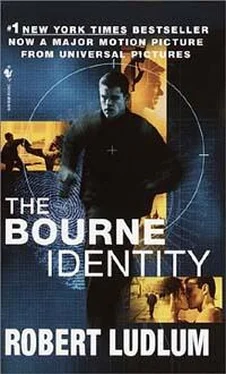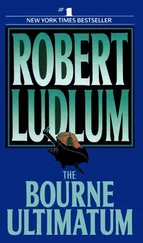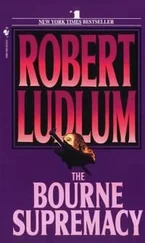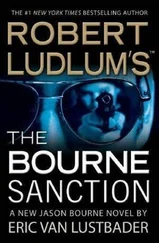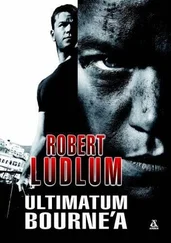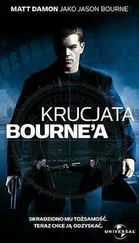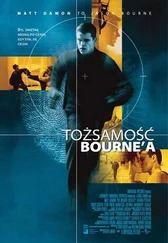“My darling, my darling. Don’t let them do this to you!” Her spoken words did not startle now, for it was as though he were there in the room, listening, heeding his own words, willing to run, disappear … with her. But at the core of her understanding she knew he could not do that; he could not settle for a half-truth, or three-quarters of a lie.
They want him isolated.
Who were they ? The answer was in Canada and Canada was cut off, another trap.
Jason was right about Paris; she felt it, too. Whatever it was, was here. If they could find one person to lift the shroud and let him see for himself he was being manipulated, then other questions might be manageable, the answers no longer pushing him toward self-destruction. If he could be convinced that whatever unremembered crimes he had committed, he was a pawn for a much greater single crime, he might be able to walk away, disappear with her. Everything was relative.
What the man she loved had to be able to say to himself was not that the past no longer existed, but that it had, and he could live with it, and put it to rest. That was the rationalization he needed, the conviction that whatever he had been was far less than his enemies wanted the world to believe, for they would not use him otherwise. He was the scapegoat, his death to take the place of another’s. If he could only see that, if she could only convince him. And if she did not, she would lose him. They would take him; they would kill him.
They.
“Who are you?” she screamed at the window, at the lights of Paris outside. “Where are you?” She could feel a cold wind against her face as surely as if the panes of glass had melted, the night air rushing inside. It was followed by a tightening in her throat, and for a moment she could not swallow … could not breathe. The moment passed and she breathed again. She was afraid; it had happened to her before, on their first night in Paris, when she had left the café to find him on the steps of the Cluny. She had been walking rapidly down the Saint-Michel when it happened: the cold wind, the swelling of the throat … at that moment she had not been able to breathe. Later she thought she knew why; at that moment also, several blocks away inside the Sorbonne, Jason had raced to a judgment that in minutes he would reverse—but he had reached it then. He had made up his mind he would not come to her.
“Stop it!” she cried. “It’s crazy,” she added, shaking her head, looking at her watch. He had been gone over five hours; where was he? Where was he?
Bourne got out of the taxi in front of the seedily elegant hotel in Montparnasse. The next hour would be the most difficult of his briefly remembered life—a life that was a void before Port Noir, a nightmare since. The nightmare would continue, but he would live with it alone; he loved her too much to ask her to live it with him. He would find a way to disappear, taking with him the evidence that tied her to Cain. It was as simple as that; he would leave for a nonexistent rendezvous and not return. And sometime during the next hour he would write her a note:
It’s over. I’ve found my arrows. Go back to Canada and say nothing for both our sakes. I know where to reach you.
The last was unfair—he would never reach her—but the small, feathered hope had to be there, if only to get her on a plane to Ottawa. In time—with time—their weeks together would fade into a darkly kept secret, a cache of brief riches to be uncovered and touched at odd quiet moments. And then no more, for life was lived for active memories; the dormant ones lost meaning. No one knew that better than he did.
He passed through the lobby, nodding at the concierge, who sat on his stool behind the marble counter, reading a newspaper. The man barely looked up, noting only that the intruder belonged.
The elevator rumbled and groaned its way up to the fifth floor. Jason breathed deeply and reached for the gate; above all he would avoid dramatics—no alarms raised by words or by looks.
The chameleon had to merge with his quiet part of the forest, one in which no spoors could be found. He knew what to say; he had thought about it carefully as he had the note he would write.
“Most of the night walking around,” he said, holding her, stroking her dark red hair, cradling her head against his shoulder … and aching, “chasing down cadaverous clerks, listening to animated nonsense, and drinking coffee disguised as sour mud. Les Classiques was a waste of time; it’s a zoo. The monkeys and the peacocks put on a hell of a show, but I don’t think anyone really knows anything. There’s one outside possibility, but he could simply be a sharp Frenchman in search of an American mark.”
“He?” asked Marie, her trembling diminished.
“A man who operated the switchboard,” said Bourne, repelling images of blinding explosions, and darkness and high winds as he pictured the face he did not know but knew so well. That man now was only a device; he pushed the images away. “I agreed to meet him around midnight at the Bastringue on rue Hautefeuille.”
“What did he say?”
“Very little, but enough to interest me. I saw him watching me while I was asking questions. The place was fairly crowded, so I could move around pretty freely, talk to the clerks.”
“Questions? What questions did you ask?”
“Anything I could think of. Mainly about the manager, or whatever she’s called. Considering what happened this afternoon, if she were a direct relay to Carlos, she should have been close to hysterics. I saw her. She wasn’t; she behaved as if nothing had happened except a good day in the shop.”
“But she was a relay, as you call it. D’Amacourt explained that. The fiche.”
“Indirect. She gets a phone call and is told what to say before making another call herself.”
Actually, Jason thought, the invented assessment was based on reality. Jacqueline Lavier was, indeed, an indirect relay.
“You couldn’t just walk around asking questions without seeming suspicious,” protested Marie.
“You can,” answered Bourne, “if you’re an American writer doing an article on the stores in Saint-Honoré for a national magazine.”
“That’s very good, Jason.”
“It worked. No one wants to be left out.”
“What did you learn?”
“Like most of those kinds of places, Les Classiques has its own clientele, all wealthy, most known to each other and with the usual marital intrigues and adulteries that go with the scene. Carlos knew what he was doing; it’s a regular answering service over there, but not the kind listed in a phone book.”
“People told you that?” asked Marie, holding his arms, watching his eyes.
“Not in so many words,” he said, aware of the shadows of her disbelief. “The accent was always on this Bergeron’s talent, but one thing leads to another. You can get the picture. Everyone seems to gravitate to that manager. From what I’ve gathered, she’s a font of social information, although she probably couldn’t tell me anything except that she did someone a favor—an accommodation—and that someone will turn out to be someone else who did another favor for another someone. The source could be untraceable, but it’s all I’ve got.”
“Why the meeting tonight at Bastringue?”
“He came over to me when I was leaving and said a very strange thing.” Jason did not have to invent this part of the lie. He had read the words on a note in an elegant restaurant in Argenteuil less than an hour ago. “He said, ‘You may be what you say you are, and then again you may not.’ That’s when he suggested a drink later on, away from Saint-Honoré.” Bourne saw her doubts receding. He had done it; she accepted the tapestry of lies. And why not? He was a man of immense skill, extremely inventive. The appraisal was not loathsome to him; he was Cain.
Читать дальше
